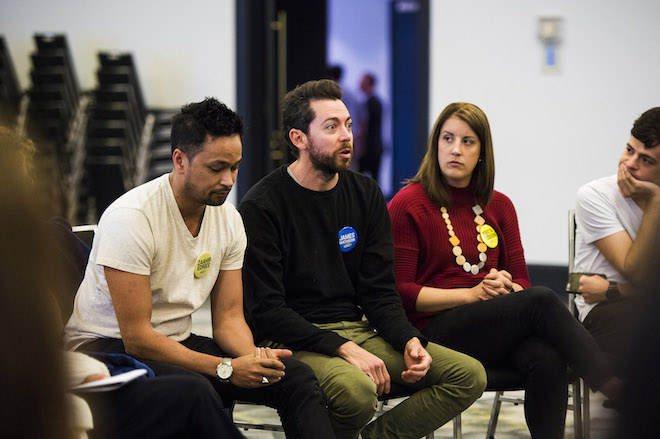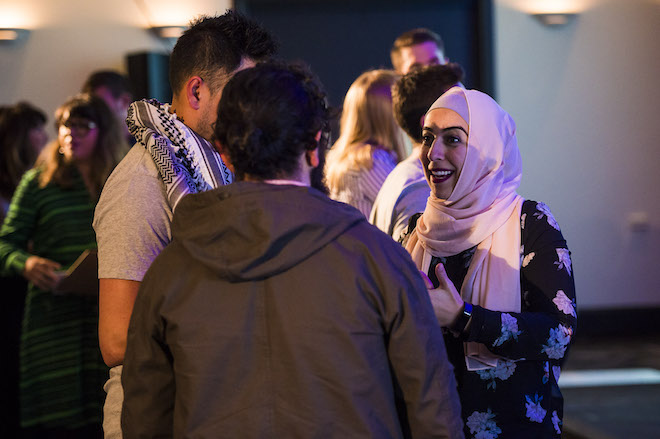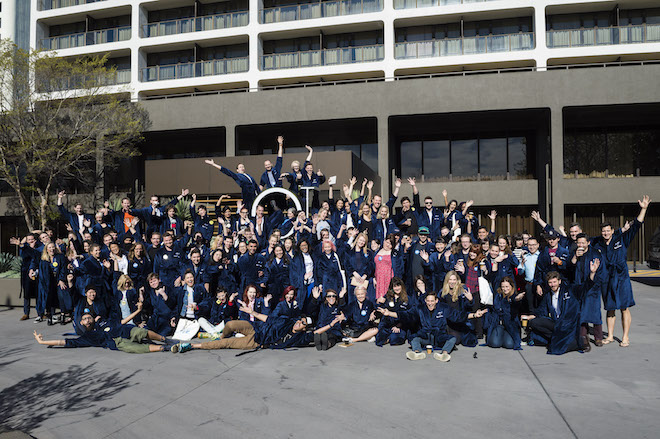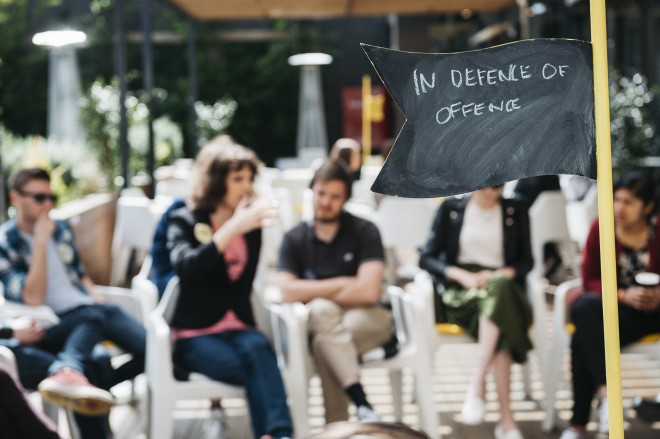Eight Things We Learned At Junket 2016
From a new political party to an explainer session on queefing. This year was a big one.

Junket, our annual unconference out of Canberra, is over for another year and we’re all sitting in that confusing sweet spot of completely happy and totally exhausted.
We invited 200 of the most exciting young people in Australia to bunker down in a hotel in the capital. We talked about Indigenous reconciliation. We talked about violence against women. We questioned things like parenting structure and the debate around marriage equality and islamophobia and time and cultural appropriation and sex ed and mental health services and welfare and the state of the media.
And, hey we didn’t sleep all that much, but we definitely learned a thing or two. Here are some of the takeaways from our editorial crew:
“WE’RE ALL GOING TO DIE” And Other Ideas From Day One Of Junket 2016
A new political movement might be on the horizon
One of the themes that ran throughout Junket was the sense that ‘official politics’ (both those in the current establishment and the system itself) was failing and marginalised groups were being impacted the hardest. There was a specific session dedicated to exploring how we could “un-fuck politics”, but outside of that discussion, that feeling of frustration around politics cropped up again and again.
Whether it was arts funding, reconciliation, racism or mental health services being discussed, the conversation was generally around how we, as active and passionate young people, could fill the gap created by our underwhelming political class. Those that worked closely with migrant communities said they felt like they were being taken for granted by politicians who only wanted their votes. Advocates from the arts sector thought that a strategy relying on personally lobbying politicians had failed and we needed to build an alternative movement based on popular support. Others refuted the idea that young people were apathetic and disengaged, but rather they just didn’t have faith in political parties to deliver on the big issues of our time.
There was strong support for some kind of new organisation, potentially even a political party (following on from discussions prior to the event, James Mathison offered to be one of its public faces), to channel the frustration felt by young people, and other sections of the population. The challenge now is for the delegates to continue that conversation and hopefully turn it into something tangible.

– Osman Faruqi
Now is the time to be talking about racism and islamophobia
Discussions around race and racism have been a part of Junket since it started last year, but there was a sense of urgency this time around, fuelled by the rise of Pauline Hanson and One Nation.
Many at the event were interested in hearing from Muslim delegates about their experiences of Islamophobia and what they could do to help combat it. What emerged from the discussion was a strong feeling that the issue wasn’t just about Islamophobia, but racism more broadly. Negative sentiment towards Muslims couldn’t be dealt with on its own, we had to tackle the injustices suffered by Indigenous Australians and the struggles faced by all people of colour.
The idea of creating an alliance of people of colour was raised, in order to facilitate campaigns and public responses to the kind of fear-mongering, racist rhetoric that’s becoming more and more common. It was great to see people from all walks of life, including those who don’t consider themselves activists or even particularly politically engaged, keen on looking for ways that they could help.

Conferences like Junket can feel like a bit of a bubble, where we agree more than we disagree. But at Junket I was watching discussions about racism and Islamophobia that I haven’t seen happen anywhere else. They won’t fix the issue, but if the ideas raised are followed through and the editors, business owners, writers, artists and others present take on board the advice, we can go a long way in fixing some of the problems that are within our control.
– Osman Faruqi
If you give people comfortable bathrobes, they will never take them off
At the opening session on Sunday, the delegates received very plush, very cosy Qantas bathrobes to wear to a big breakfast the following morning. What we didn’t anticipate is that people would put on their robes straight away. And wear them all day on Monday. And put them on again for the closing session on Tuesday.
It may have not seemed weird in the Junket bubble, but the boomers who were also checked in at the hotel did look at us like we were some sort of highly excitable cult.

ONE OF US. ONE OF US.
– Sinead Stubbins
Sometimes participating well in a discussion means shutting the fuck up
It may seem obvious that in a conversation about racial discrimination, the impact of colonisation and cultural appropriation, people of colour should have the floor and be the main focus of the session. But as anyone who has ever been to a bad panel (or watched Q&A) knows, this isn’t always the case.
My biggest takeaway from Junket was knowing when I — as a white person — needed to shut up at times and listen about experiences outside of my own. The first step towards being a good ally is to stop taking space away from non-white people and to be okay with the fact that you’re going to feel uncomfortable sometimes. It shouldn’t be the burden of people of colour to continually make white people comfortable in discussions bout race, and heaps of the sessions made me rethink how I approach these issues in my own life.
You can't benefit from a world that hurts us, then ask us to be tough & gentle at the same time –@IndigenousX
Preach.
Ps robe ?#Junket pic.twitter.com/Rlh30iXZKs
— Sara Saleh (@SaraSalehOz) September 27, 2016
I didn’t go to Junket last year, so didn’t know what to expect (and wondered if the outcomes tended to be a little vague) but particularly in talks about dealing with cultural appropriation with music directors and festival organisers, these big idealogical conversations had some practical outcomes. It was a real privilege and rarity to be able to discuss race so frankly.
– Sinead Stubbins
We need to talk more about disability in Australia
One of my favourite sessions, which was run by Brigid Canny from the Foundation for Young Australians and Paralympic wheelchair basketball player Amber Merritt, was about the idea of ‘passing’ as an able-bodied person when your disability is invisible. One of the great ideas to come from the session was the idea of building a resource for people running events, explaining how to make them more accessible. The responsibility shouldn’t always on people with disabilities to make their participation possible.
There weren’t many people at this session — though that may not mean much as there were so many good sessions in each time slot — which was unfortunate, because disability still isn’t adequately represented in Australia, despite people with disabilities making up around 20 percent of the population. Brigid suggested that we think about making Junket more accessible for hearing impaired people next year, which was a great point.
@brigidcanny reminding #junket to keep accessibility in mind, particularly for those w/ disabilities pic.twitter.com/eaqY5WZ54Y
— Larissa Baldwin (@IndigenousX) September 26, 2016
– Sinead Stubbins
Nothing unites people like Beyonce
Few quick things: if you live anywhere near Amrita Hepi’s Beyonce dance classes, you need to get yourself booked in quick. Also, if you know that a big ol’ bunch of drunk people have just been taught the dance moves to ‘Formation’, your DJ set is sorted for the night. (Thanks Levins)
– Meg Watson
We should have weird, unwieldy conversations more often
Junket is definitely full of people who want to Make A Difference. Marriage equality activists were plotting plans to keep the general public engaged on the issue and directly push action from politicians. There were very practical talks about the best way of creating a new mental health curriculum for Australian schools and creating better systems to deal with sexual assault on university campuses. Some of these ideas received money from sponsors to kickstart further action.
But some of the best attended and most interesting sessions, came totally out of left field.
At one point, futurist Eddie Harran interrogated a group’s perception of linear time and challenged them to make it tangible. “Where are the past, present, and future on my body?” he asked while standing, limbs spread wide in front of 50 pleasantly mystified strangers. Moments later he spoke about our dual conceptions of time while holding a computer displaying a picture of an iceberg atop his head.
Moments before this, sex worker and porn star Luciee Bee sat down with a smaller group to chat about the failings of adult sex ed and ended up giving an impromptu lesson on what queefing and smegma are. The talk ended with people sharing their own hangups about sex and bodies — some of which they’d never openly discussed before.
These kind of conversations are rare — usually the domain of houseparties at around the 4am mark, let’s be real — but that doesn’t need to be the case! It may not change the world, but we’d all be a bit better off with a little more talk about queefing.

– Meg Watson
It’s not perfect for everybody!
Junket is only in its second year, and we’re still really open to ways to make it better. One concern that’s been raised is that it’s particularly tough on introverted people or those who suffer from anxiety. Many delegates were visibly struggling to put forward their ideas on stage during the opening session. Others spoke about the social anxiety involved in enormous days of jam-packed sessions. Describing herself as a “loud-shy”, Jordan Raskopoulos hosted a session on that very topic.
Huge respect for every nervous person on the #junket stage. It's hard but it's so nice to see you're not the only one cries and shakes ?
— Meg Watson (@msmegwatson) September 25, 2016
Suffering from generalised anxiety and a pretty strong aversion to public speaking myself, I understand this completely. In its current form, the event certainly privileges those who feel comfortable sharing their big ideas in an extremely public and (inadvertently) high-pressure setting. New strategies have since been forwarded including having prior delegates acting as surrogates for people on-stage. We’ll work on it.
Crikey‘s media reporter Myriam Robin has also offered a staunch critique of the event labelling it a meeting of the “tyrannical left”. “There is no room for dissent at Junket. Be inspired, be inspirational, or shut the hell up,” the piece states. This certainly wasn’t my experience of the sessions I attended, and I saw quite a number of confrontations or conflicts in ideas or strategies which were kept respectful. It is however true that most delegates were of the same political persuasions, so there could be a point there for greater ideological diversity going forward.
After stating that her editor “thought the whole thing ridiculous” and “wanted [her] to blow it wide open”, the bulk of Robin’s piece was dedicated to complaints with the integration of corporate sponsorship into the event. She rightly noted there were partnerships with brands including Qantas, Westpac, and 42 Below vodka — all of whom offered some kind of freebie or prize to delegates to further their endeavours. “[This] leftie corporate heaven was my own personal hell,” she wrote.
There’s certainly a larger conversation to be had about the way that activism, cultural work, or political ideology can coincide and clash with the interests and investment of corporations. I understand why this may be a problem for some. From our end, an event like this couldn’t take place without the backing of brands and I feel that that facet of the conference didn’t change the behaviour or actions of those involved. One of the final sessions was actually a vigorous debate on this topic.
That being said, I’m open to the critique. Junket isn’t exactly the kind of thing which shies away from big conversations.
– Meg Watson
You can read more about Junket here.






